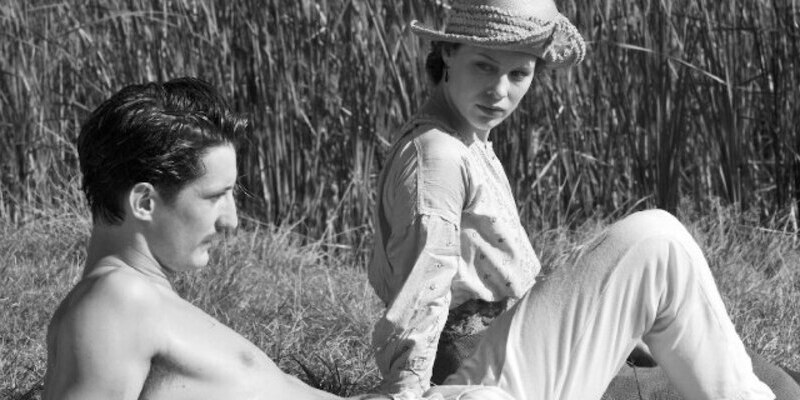
In the aftermath of WWI, a grieving German widow encounters a French man
who claims to have known her husband.
Review by John Bennett
Review by John Bennett
Directed by: Francois Ozon
Starring: Pierre Niney, Paula Beer, Ernst Stotzner, Marie
Gruber

The prolific French director François Ozon had one of the biggest
successes at the 2016 Venice Film Festival with Frantz, his lyrical reinterpretation of Ernst Lubitsch’s
Broken Lullaby (1932). A World War I era
romantic-psychological-drama shot in sumptuous black and white that
occasionally melts into pastel color, Frantz is worth seeking
out for its continental class and its twists and turns, even if it plays it
too safe in terms of both its pathos and its malaise.
The title character of Ozon’s film has died well before the film’s action
begins. Frantz Hoffmeister, a young German violinist, has been killed as a
soldier in the First World War. His deeply bereaved parents (Ernst Stötzner
and Marie Gruber) take in Frantz’s fiancé, Anna (Paula Beer),
as a sort of surrogate daughter who can bear their grief along with them.
When a mysterious stranger begins visiting Frantz’s memorial in Germany,
Anna's curiosity is piqued. The stranger turns out to be a Frenchman, Adrien
(Pierre Niney), who claims that he became close with Frantz while the
two lived in Paris at the dawn of the war. Though the French are still
viewed as enemies by many in the Hoffmeisters' community, the family
eventually warms to Adrien, hanging on his every anecdote about Frantz. But
Adrien has a dark secret that only a catastrophic war could necessitate - a
secret Anna soon discovers, a secret that forever changes the dynamic of
their relationship…

For the first portion of the film, the Hoffmeisters' loss combined with
Pierre Niney’s delicately haunted performance make for a genuinely moving
experience. This gentle, pained, sophisticated connection certainly draws
from the Lubitsch touch of the source material. The rapt expressions on the
Hoffmeisters' faces as they vicariously recreate their son’s presence
through Adrien’s stories remind one of the sweetly pained look in Carole
Lombard’s face and voice in To Be or Not to Be (1942), just as
the sumptuous slow blossoming of Anna’s and Adrien’s chaste romance invokes
Gene Tierney and Don Ameche in Heaven Can Wait (1943). This
gentle sadness is made all the more poignant by the silkiness of Ozon’s
subtle and unassuming images.
But among the sophistication, Frantz’s first half is occasionally dogged by moments of sticky sentimentality.
As Hans Hoffmeister (Frantz’s father) learns to overcome the prejudices he
harbours against the French through Adrien, we see organic character
development; but Ozon draws attention to this development in an
unnecessarily didactic speech that Hans makes to his associates about the
ugliness of war and xenophobia. It’s a nice thought, but it’s also a
cinematically middlebrow way of making a point. And Frantz’s emotional power diminishes even more considerably once Adrien reveals
his sinister secret to Anna. This serves to not only push the film’s
narrative past the realm of plausibility, but also reveals that what one
thought to be genuine feeling was actually building to something more
gimmicky than humanist. The revelation of the secret retroactively makes
maudlin what was moving.

However, the film regains some of its footing when it dramatically changes
gears. When Anna goes to France in an attempt to find Adrien later on,
Frantz gathers a new kind of momentum, separate but not
disjointed from its first half. As Anna searches for Adrien in France, we
get a new appreciation for Adrien’s status as an outsider; when we first
meet Adrien in Germany, we see his status as a foreigner from the German
perspective. Consequently, we share Anna’s experience as an outsider when we
accompany her to France - when she faces the same kind of xenophobia Adrien
faced, the menace takes on a new meaning. This sense of menace is compounded
by the mystery of Adrien’s whereabouts in France, thus creating a strong,
resonant atmosphere of unease that nicely compliments the first half’s
genuinely moving moments (if not the maudlin ones) without feeling too
distant from them (largely thanks to Beer’s consistent performance).
However, just as the first half loses some of its punch, once Anna finds
Adrien in France, the sinister atmosphere loses traction in the film’s final
few sequences.
Frantz may be a remake of Broken Lullaby, but, through the crispness of its black-and-white photography and the
occasionally perverse mysteriousness of the WWI-era Prussian setting, the
film reminds one of Michael Haneke’s The White Ribbon. At one point early in the film, Adrien describes a painting he and Frantz
had admired, prompting Anna to conjure an image of a work of
Boticelli-caliber splendor. When, in Paris, Anna looks for the painting, she
realizes Adrien has been referring to Manet’s Le Suicidé. It’s a shocking,
unsettling moment - a moment whose disturbing aura Ozon depicts as
symptomatic of bigger, more ineluctable human moral failings in much the
same way as Haneke. Ozon and cinematographer Pascal Marti use
black-and-white cinematography to a similar end as Haneke and
cinematographer Christian Berger in The White Ribbon. In both films, as the veneer of society erodes in Germany in the 1910s,
the black and white images allow dark shadows to play on the faces of the
characters, cueing us to catch on to when they lie, withhold truth, or
inflict some deceptive, subtle abuse against someone else. Though
The White Ribbon accomplishes this effect with a far more
chilling austerity, Frantz doesn’t lack its share of these
memorably sinister moments.

Though it is often moving, though it is occasionally dark, and though it is
generally visually pleasing, Frantz never wholly surrenders
itself to the champagne chic of a Lubitsch film just as it never plunges
into the murky depths of social ills like The White Ribbon. If Ozon had made a perfect film, Frantz would have been a
stunning synthesis of these two non-mutually exclusive sensibilities.
Instead, the film merely straddles and meanders between these two modes.
That’s not to say Frantz is bad - many of its moments and
visuals are very effective. It’s often a beautiful film, but it never floats
quite as gracefully or broods quite as darkly as it should.

Frantz is on BFI Player now.
